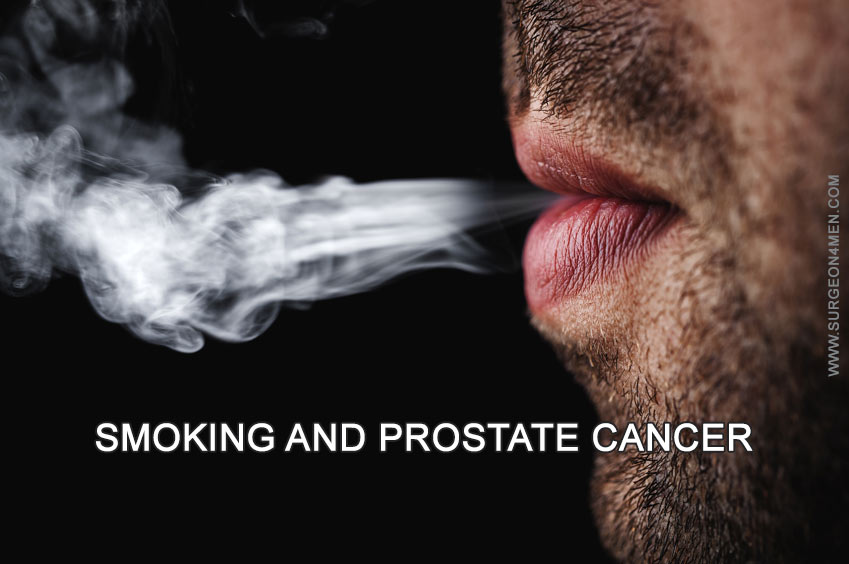Smoking and Prostate Cancer
Prostate cancer is the most commonly diagnosed solid tumor and is the second leading cause of cancer related mortality in American men. According to statistics available, one in every six men in the US will develop prostate cancer during his lifetime. Estimates by the American Cancer Society say that nearly 32,000 men died due to this cancer in 2010 alone.
Some of the important risk factors associated with prostate cancer include advanced age, history of prostate cancer in first degree relatives, and African-American descent. However, new studies have shown that environmental factors also play an important role in the development of prostate cancer. Cigarette smoking is one modifiable risk factor that has stood out in all prostate cancer related studies.
Influence of Smoking on Prostate Cancer
 According to studies, people who smoke cigarettes are more likely to develop an aggressive form of prostate cancer as compared to non-smokers. Men who smoked more cigarettes in 10 years before undergoing radical prostatectomy have an increased risk of developing high grade cancer or cancer which spreads beyond the prostate gland more quickly. Men who have smoked more than 40 pack-years are three times more likely to develop more aggressive form of prostate cancer. The risk is more for current smokers as compared to people who have quit smoking.
According to studies, people who smoke cigarettes are more likely to develop an aggressive form of prostate cancer as compared to non-smokers. Men who smoked more cigarettes in 10 years before undergoing radical prostatectomy have an increased risk of developing high grade cancer or cancer which spreads beyond the prostate gland more quickly. Men who have smoked more than 40 pack-years are three times more likely to develop more aggressive form of prostate cancer. The risk is more for current smokers as compared to people who have quit smoking.
However, in men who have quit smoking before the prostate cancer is diagnosed, the cancer is slow-growing and more amenable to treatment.
Reasons Behind Aggressive Form of Prostate Cancer in Smokers
Different scientists have postulated different theories for the development of more aggressive form of prostate cancer in smokers. Some of these are:
- Oxidative Damage: Scientists have found out that free radicals cause a build-up of toxic materials in the cells leading to cell damage. However, our body produces various enzymes that can control the damage produced by these free radicals. One such enzyme is glutathione-S -transferase p, called GS T-p. Cigarette smoke contains a carcinogen known as benzopyrene which is cleaned up by GS T-p. However, in cancer cells, GS T-p is destroyed because of genetic mutation. In case of prostate cancer, the loss of GS T-p leads to increased damage to cells. Moreover, in case of smokers, the benzopyrene carcinogens act unhindered leading to more damage.
 Cigarette Smoking Alters the Hormonal Balance: Cigarette smoking increases the levels of bio-available testosterone and reduces the levels of bio-available estradiol. It also increases the levels of DHT, a metabolite of testosterone. Both testosterone and DHT are associated with increased cell proliferation in the prostate gland, which can lead to their potential malignant transformation. Estradiol, on the other hand, suppresses the secretion of gonadotropins through its action on the pituitary and hypothalamus glands. This, in turn, reduces the production of testosterone. Cigarette smoking changes the hormonal environment in favor of prostate cancer.
Cigarette Smoking Alters the Hormonal Balance: Cigarette smoking increases the levels of bio-available testosterone and reduces the levels of bio-available estradiol. It also increases the levels of DHT, a metabolite of testosterone. Both testosterone and DHT are associated with increased cell proliferation in the prostate gland, which can lead to their potential malignant transformation. Estradiol, on the other hand, suppresses the secretion of gonadotropins through its action on the pituitary and hypothalamus glands. This, in turn, reduces the production of testosterone. Cigarette smoking changes the hormonal environment in favor of prostate cancer.
- Smokers Are Less Careful About Their Health: It has been observed that compared to non-smokers, smokers are more callous about their health. They are less likely to go for regular health check-ups or prostate cancer screenings. Therefore there in increased likelihood of a late diagnosis of prostate cancer in them. The disease is diagnosed when it is already in a more advanced stage and is less amenable to treatment.
The role of cigarette smoking in the development of more aggressive form of prostate cancer is more or less established. However, it is a modifiable risk factor. Men should be encouraged to quit smoking before it is too late.

